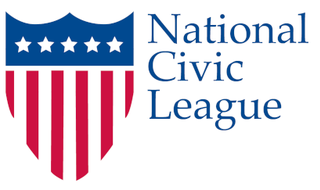Related Research Articles

Natural resources are resources that are drawn from nature and used with few modifications. This includes the sources of valued characteristics such as commercial and industrial use, aesthetic value, scientific interest, and cultural value. On Earth, it includes sunlight, atmosphere, water, land, all minerals along with all vegetation, and wildlife.

The University for Peace (UPEACE) is an international graduate-only university and intergovernmental organization. The university was established as a treaty organisation by the United Nations General Assembly in 1980.

The National Civic League is an American nonpartisan, non-profit organization founded in 1894 as the "National Municipal League," it adopted its new name in 1937. Its mission is to advance civic engagement to create equitable, thriving communities. To upgrade quality and efficiency of government in cities it enlists the business and professional classes, and promotes greater involvement in government. It also sought create merit-based systems for selecting public officials. The League envisions a country where the full diversity of community members are actively and meaningfully engaged in local governance, including both decision making and implementation of activities to advance the common good. It also promotes professional management of local government through publication of "model charters" for both city and county governments.

Environmental policy is the commitment of an organization or government to the laws, regulations, and other policy mechanisms concerning environmental issues. These issues generally include air and water pollution, waste management, ecosystem management, maintenance of biodiversity, the management of natural resources, wildlife and endangered species. For example, concerning environmental policy, the implementation of an eco-energy-oriented policy at a global level to address the issues of global warming and climate changes could be addressed. Policies concerning energy or regulation of toxic substances including pesticides and many types of industrial waste are part of the topic of environmental policy. This policy can be deliberately taken to influence human activities and thereby prevent undesirable effects on the biophysical environment and natural resources, as well as to make sure that changes in the environment do not have unacceptable effects on humans.

Ibrahima Kassory Fofana is a Guinean politician who served as Prime Minister of Guinea between 21 May 2018 and 5 September 2021.

The Bottom Billion: Why the Poorest Countries are Failing and What Can Be Done About It is a 2007 book by Paul Collier, Professor of Economics at Oxford University, exploring the reasons why impoverished countries fail to progress despite international aid and support. In the book Collier argues that there are many countries whose residents have experienced little, if any, income growth over the 1980s and 1990s. On his reckoning, there are just under 60 such economies, home to almost 1 billion people.
Daniel Kaufmann is the president emeritus of the Natural Resource Governance Institute (NRGI), which resulted from the merger of the Revenue Watch Institute – Natural Resource Charter. He is also a nonresident senior fellow at the Brookings Institution, where he was previously a senior fellow, and until July 2019 served in the international board of the Extractive Industries Transparency Initiative and in a number of advisory boards on governance, anti-corruption and natural resources and has also been in high-level expert commissions such as at the Organisation for Economic Co-operation and Development, the Inter-American Development Bank and the Mo Ibrahim Foundation. Prior to that, he was a director at the World Bank Institute, leading work on governance and anti-corruption. He was also a senior manager and lead economist at the World Bank, writing and working on many countries around the world, and was a visiting scholar at Harvard University. He has also served in other boards and councils in the past, including at the World Economic Forum.

Sustainability is a social goal pertaining to the ability of people to inhabit the Earth well into the future. Specific definitions of this term are disputed and have varied with literature, context, and time. Experts often describe sustainability as having three dimensions : environmental, economic, and social, and many publications emphasize the environmental dimension. In everyday use, sustainability often focuses on countering major environmental problems, including climate change, loss of biodiversity, loss of ecosystem services, land degradation, and air and water pollution. The idea of sustainability can guide decisions at the global, national, and individual levels. A related concept is sustainable development, and the terms are often used to mean the same thing. UNESCO distinguishes the two like this: "Sustainability is often thought of as a long-term goal, while sustainable development refers to the many processes and pathways to achieve it."
A resource war is a type of war caused by conflict over resources. In a resource war, there is typically a nation or group that controls the resource and an aggressor that wishes to seize control over said resource. This power dynamic between nations has been a significant underlying factor in conflicts since the late 19th century. Following the rise of industrialization, the amount of raw materials an industrialized nation uses to sustain its activities is heightened.

Sustainability measurement is a set of frameworks or indicators to measure how sustainable something is. This includes processes, products, services and businesses. Sustainability is difficult to quantify. It may even be impossible to measure. To measure sustainability, the indicators consider environmental, social and economic domains. The metrics are still evolving. They include indicators, benchmarks and audits. They include sustainability standards and certification systems like Fairtrade and Organic. They also involve indices and accounting. And they can include assessment, appraisal and other reporting systems. These metrics are used over a wide range of spatial and temporal scales. Sustainability measures include corporate sustainability reporting, Triple Bottom Line accounting. They include estimates of the quality of sustainability governance for individual countries. These use the Environmental Sustainability Index and Environmental Performance Index. Some methods let us track sustainable development. These include the UN Human Development Index and ecological footprints.

The Ibrahim Index of African Governance (IIAG), established in 2007, provides an annual assessment of the quality of governance in African countries. Compiled by combining over 100 variables from more than 30 independent African and global institutions, the IIAG is the most comprehensive collection of data on African governance.
La Silla Vacía is a Colombian news website founded by journalist and writer Juanita León in 2009. The site focuses primarily on Colombian politics.
The Natural Resource Charter is a global initiative to assist governments and societies of countries rich in non-renewable natural resources to effectively govern those resources in a way that generates economic growth, promotes the welfare of the population and is environmentally sustainable.
Laury Haytayan is a Lebanese oil and gas expert in the Middle East and North Africa. Since 2011, she has been leading the parliamentary capacity development portfolio at the Natural Resource Governance Institute (NRGI) in the MENA region, focusing on the legislative and oversight roles of Arab parliamentarians in advancing reforms in the Middle East Oil and Gas sector.

Parliamentary elections are scheduled to be held in Chad in 2024.
Noël Kabamba Tshiani Muadiamvita is a Congolese economist and politician. He was a presidential candidate in the 2018 Congolese general election. In 2021 and 2023, Tshiani proposed a law to restrict various government positions to only individuals who were born to Congolese parents.

Damilola Sunday Olawuyi, SAN, FCIArb, is an international jurist, professor of law, arbitrator, author and policy consultant, with expertise in petroleum, mining, energy and environmental law. He is the Deputy Vice Chancellor of Afe Babalola University, Ado Ekiti, Nigeria. Professor Olawuyi was promoted to the rank of Full Professor of Law at the age of 32 years, becoming one of the youngest full professors of law in Nigerian history. He became a Senior Advocate of Nigeria in 2020, aged thirty-seven, becoming the youngest academic ever elevated to the rank of a senior advocate of Nigeria.

Climate change in Nigeria is evident from temperature increase, rainfall variability. It also reflects in drought, desertification,rising sea levels, erosions, floods, thunderstorms, burning of fossil fuels, bush fires, landslides, land degradation, more frequent, extreme weather conditions and loss of biodiversity. All of which continues to negatively affect human and animal life and also the ecosystems in Nigeria. Although, depending on the location, regions experience climate change with significant higher temperatures during the dry seasons while rainfalls during rainy seasons help keep the temperature at milder levels. The effects of climate change prompted the World Meteorological Organization, in its 40th Executive Council 1988, to establish a new international scientific assessment panel to be called the International Panel on Climate Change (IPCC). The 2007 IPCC's fourth and final Assessment Report (AR4) revealed that there is a considerable threat of climate change that requires urgent global attention. The report further attributed the present global warming to largely anthropogenic practices. The Earth is almost at a point of no return as it faces environmental threats which include atmospheric and marine pollution, global warming, ozone depletion, the dangers of pollution by nuclear and other hazardous substances, and the extinction of various wildlife species.

Gagan Gupta is the founder and CEO of Arise IIP, Arise IS and Arise P&L, three branches of a pan-African industrial operator and developer.
References
- ↑ Self-description by the National Resource Governance Institute. Retrieved February 18th, 2018.
- ↑ Strategic Plan of the National Resource Governance Institute. Retrieved February 18th, 2018.
- ↑ Offices of NRGI. Retrieved on February 18th, 2018.
- ↑ Priority countries in NRGI's work. Retrieved July 18th, 2023.
- ↑ Leadership Team at NRGI. Retrieved January 26, 2021.
- ↑ Board of Directors at NRGI. Retrieved January 14, 2022.
- ↑ Advisory Council of NRGI. Retrieved July 18th, 2023.
- ↑ Strategic Plan of the National Resource Governance Institute. Retrieved February 18th, 2018.
- ↑ Tools developed by NRGI. Retrieved February 18th, 2018.
- ↑ "State-owned fossil fuel firms' plan to invest $1.9tn could destroy climate hopes". the Guardian. 2021-02-09. Retrieved 2022-06-16.
- ↑ "The Climate Question - What will happen to the fossil fuel workers? - BBC Sounds". www.bbc.co.uk. Retrieved 2022-06-16.
- ↑ "Colombia's Ecopetrol seeks to reduce dependence on oil". Financial Times. 2021-03-29. Retrieved 2022-06-16.
- ↑ Manley, Patrick R. P. Heller, David. "Energy Transition Is the Future. National Oil Companies Are Betting on the Past". Foreign Policy. Retrieved 2022-06-16.
- ↑ Whoriskey, Peter; Armendariz, Agustin. "Secret trove illuminates the lives of billionaires". Washington Post. Retrieved 2022-06-16.
- ↑ "Report predicts huge losses in NNPC as other NOCs transition". The Guardian Nigeria News - Nigeria and World News. 2021-02-11. Retrieved 2022-06-16.
- ↑ Awal, Mohammed (2022-04-12). "How Ghana can map its energy transition journey". The Business & Financial Times. Retrieved 2022-06-16.
- ↑ "Less is more: Lessons for our tax structure". The Citizen. 2021-06-29. Retrieved 2022-06-16.
- ↑ Vacía, La Silla. "El futuro del carbón térmico en Colombia". La Silla Vacía - Últimas noticias locales y nacionales (in Spanish). Retrieved 2022-06-16.
- ↑ LR, Redacción (2021-06-24). "Minería: autoridades deben mejorar el acceso a la información y fortalecimiento de normas ambientales y sociales". larepublica.pe (in Spanish). Retrieved 2022-06-16.
- ↑ "Comment l'Afrique peut remporter la bataille de la transition énergétique – Jeune Afrique". JeuneAfrique.com (in French). Retrieved 2022-06-16.
- ↑ NRGI (2018). Natural Resource Charter (2nd ed.). Retrieved February 23rd, 2018.
- ↑ NRGI (2017). 2017 Resource Governance Index. Retrieved February 23rd, 2018.